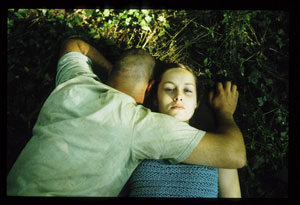-
Bruno Dumont: Flanders/Flandres (2006)
(From my original review.)
BRUNO DUMONT: FLANDERS/FLANDRES (2006)

The war abroad and the war at home
In a way, Bruno Dumont's Flandres is no more realistic than Cuarón's Children of Men. It doesn't exactly seek to depict real people or a real war. Dumont's people are laconic, but the powerful filmmaking tells a clear and moving story. Using sinple, economical means and focusing on a few individuals, presenting scenes that follow a logical, universal progression, Flandres is able to tell a profound story about war's ravages at home and on the front. Dumont's storytelling is simple and sure. So is the cinematography of Yves Cape and the editing of Guy Lacorne. And so is the acting, especially of Samuel Boidin as Démester and of Adélaïde Leroux as his girlfriend Barbe -- but also of Henri Cretel as Démester's friend Blondel, and of Jean-Marie Bruveart (Briche), David Poulain (Leclercq), Patirce Venant (Mordac), David Legay ( (Lieutenant) and Inge Decaesteker (France).
The film focuses on a young farmer and his girlfriend. He and some other locals are going off to war. Last sex, last drinks with friends, last campfire gatherings, last work in the field with a tractor.
Then, the departure: roll call, near a truck, a few people waving goodbye. Next Démester is in the desert. In an attempt to take a building (a scene we know well through documentary news footage from Iraq) one of their officers is blown up. A helicopter takes away the body. They enter the building and kill a couple of youthful partisans -- fighters, clearly, but also mere pitiful boys.
Each of the scenes is iconic and vivid. This is low-budget war, but it feels real enough. How big is the budget of a few men fighting out in the bush? There are tanks and explosions aplenty. Most of all there is sweat and dust and blood. Two other things happen. The squad captures a woman fighter, and some of the men rape her. Later, on a hillside, they trap a farmer on a donkey loaded with firewood, and they shoot him. They are subsequently captured by members of the enemy (who are North African--but their dialogue isn't translated; and they could be Iraqis) who know what they have done, and they are severely punished.
Meanwhile André's (Démester's) girlfriend Barbe at home grows more and more unstable and after a violent psychotic break, she is hospitalized, but later released.
André escapes with his friend Blondel, but when Blondel's shot, he runs off to save himself.
Dumont uses the inarticulate country talk of the people to underline the universality of the events. How did Blondel die, his girlfriend wants to know later? "Balle dans la tête," Démester says; a bullet in the head. That's all he wants to say, and all we need to know. Démester is a brute, in a way. But he's also got a sweet smile. He's childlike. He is the child sent off to kill that all war builds upon.
Next we see Démester back home. The final sequences convey how damaged he and his girlfriend and his friend's girlfriend are now. André suffers from survivor guilt. Their state is pitiful, but the last shot is positive. André is lying on the dirt with Barbe and telling her over and over "Je t'aime...je t'aime." I love you.
This is classic Dumont style, if on a bolder and grander scale than before. His people are none the less noble, pathetic, and human for being reduced to simplicity, even crudity. Dumont has told a story as energetic and forward-driven as the Dardennes brothers' L'Enfant, but more universal, and even more concise (91 rather than 100 minutes). As in Dumont's L'Humanité and La Vie de Jésus, there's a grandeur that emerges from the stripped-down, minimal scenes and people. Everything works. It's surprising that Variety's usually canny reviewer made it sound dull and off-putting. There is still resistence to Dumont's style.
Rendez-Vous with French Cinema at Lincoln Center showings March 4 and 5; IFC Center, March 3 and 6. Opened in Paris August 31, 2006. Was awarded the Grand Prize at Cannes. Now has a US distributor: International Film Circuit.
Last edited by Chris Knipp; 03-04-2007 at 11:56 AM.
 Posting Permissions
Posting Permissions
- You may not post new threads
- You may not post replies
- You may not post attachments
- You may not edit your posts
-
Forum Rules





 Reply With Quote
Reply With Quote
Bookmarks